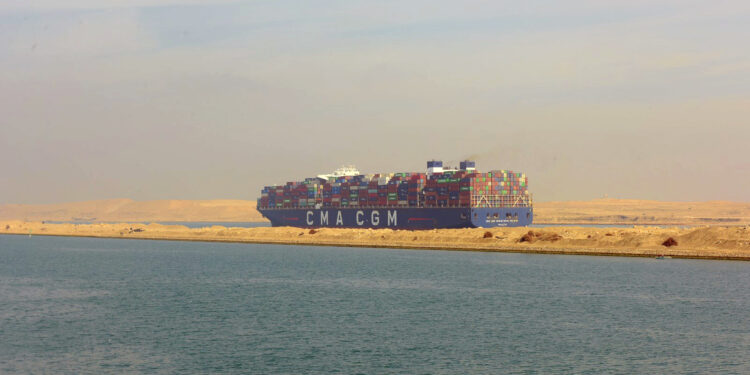The International Monetary Fund said that the Red Sea tensions caused Egypt to lose 70% of its revenues from the Suez Canal, which is a major source of foreign currency for the country.
This came in a statement issued by the Fund on Wednesday evening, after its delegation concluded its visit For Egypt It lasted from November 6 until the 20th of the same month, to conduct the fourth review of an economic reform program accompanied by an $8 billion loan.
The Fund stated that as multiple geopolitical tensions continue in the region, “the economic outlook for the region, including Egypt, remains difficult.”
He added, “The effects of the conflicts in Gaza and Israel and trade interruptions in the Red Sea continue to negatively affect morale, and cause significant declines of up to 70% in revenues from the Suez Canal, which constitutes a major source of foreign currency for Egypt.”
In solidarity with Gaza, which has been subjected to Israeli genocide since October 7, 2023, the Houthis in Yemen are attacking Israeli or related cargo ships in the Red Sea with missiles and drones, which has prompted many ships not to pass through the Suez Canal and prefer to use the Cape of Good Hope route despite the high cost. .
The Fund noted that “the increasing number of refugees is adding financial pressures on public services, especially the health and education sectors in the country.”
“It was agreed with the authorities that greater efforts will be needed to mobilize domestic revenues, contain financial risks (especially those arising from the energy sector), and expand the social safety net,” he said.
This year, Egypt suffered from a rise in inflation that exceeded 35%, before it began a downward spiral, reaching approximately 26% at the present time.
Suez Canal revenues declined by 25% during the last fiscal year ending last June, according to data from the Central Bank of Egypt. The canal’s revenues amounted to $6.6 billion, down from $8.8 billion in the previous fiscal year.
Last March, Egypt signed an agreement with the IMF regarding a financial support package worth $8 billion, to help confront the repercussions of a global economic crisis that contributed to raising the prices of goods and services in Egypt.
The agreement includes that Egypt implement economic reforms, the most important of which are:
- Transition to a flexible exchange rate system.
- Reducing spending on infrastructure projects.
- Empowering the private sector.
After the third review at the end of last June, Egypt obtained a tranche worth $820 million from the IMF.



